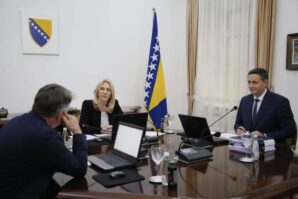Is the health system ready for the increasing number of people infected with COVID-19? Despite the mostly mild symptoms of the newly infected, the situation is getting more complicated. What worries doctors is the small number of vaccinated people and the increasing number of deaths.
In addition to the increased number of newly infected with COVID-19, the clinical picture of patients, mostly unvaccinated, is also becoming more complicated. In addition, the number of deaths is also increasing, and authorities warn and appeal for immunization in order to avoid fatal outcomes and relieve the health system.
”You can see that we have a large percentage of positivity among those tested, this means that there are many more positives than what we get through testing. There are probably many people who have mild symptoms, so they may not go to health facilities and get tested,” epidemiologist Jela Acimovic points out.
While at the beginning of the pandemic, Bosnians and Herzegovinians went to neighboring countries or waited in lines at shopping centers for hours for a dose of vaccine, today the picture is different. About 40% of the population, according to data from the non-governmental sector, received at least one dose, and these are mostly elderly people. On the other hand, citizens between the ages of 18 and 34 generally do not trust vaccines.
”I was vaccinated three times. I had COVID-19 and now I have it again. So no one should get vaccinated, not by chance,” are the words of a woman from Banja Luka.
And that “not by chance” contributed to the failure of more than 1.300.000 vaccines in the entire country, about 530.000 in the Federation of Bosnia and Herzegovina (FBiH) and about 770.000 in the Republika Srpska (RS). And in order to ensure the conditions for their storage in the central warehouse of Commodity Reserves of RS, 17 refrigerators for the controlled storage of vaccines were handed over, in the amount of 21.800 euros, which is a donation from the European Union (EU). They will be distributed among health institutions in Banja Luka, Laktasi, Kotor Varos, and Celinac.



















